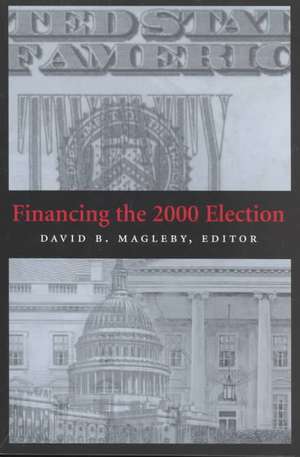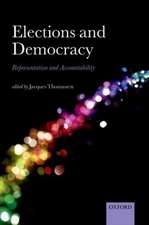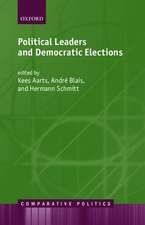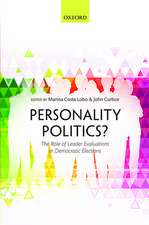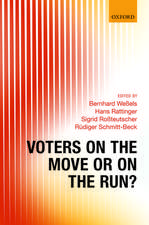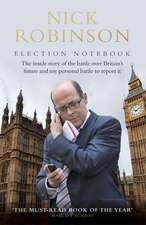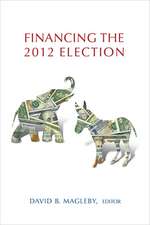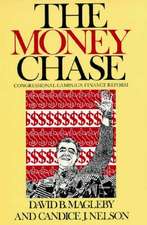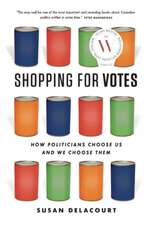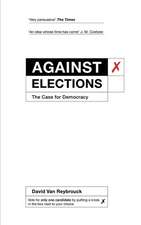Financing the 2000 Election
Editat de David B. Maglebyen Limba Engleză Paperback – 18 apr 2002
Since the 1960 national election, the nonpartisan Citizens¡¯ Research Foundation (CRF) has published a series of Financing the Election volumes, compiling reliable data on the costs and trends of campaign finance. For the 2000 edition, CRF and the Center for the Study of Elections and Democracy at Brigham Young University assembled leading political science scholars to analyze this historic election season where campaign finance was critically important. Candice J. Nelson of American University compares spending estimates in 2000 with previous election cycles, and discusses the implications of increased spending. John C. Green and Nathan S. Bigelow of the Roy Bliss Institute at the University of Akron look at the presidential nomination campaigns, while Anthony Corrado of Colby College explores the financing of the general election, including the unprecedented Florida recount battle. Paul S. Herrnson of the University of Maryland and Kelly D. Patterson of Brigham Young University review the close party balance in the House and Senate and its effect on the financing of congressional elections. Diana Dwyre of California State University-Chico and Robin Kolodny of Temple University put the role of political parties and their use of soft money in perspective. Alan J. Cigler of the University of Kansas investigates the ways interest groups attempt to influence elections. Anthony Gierzynski of the University of Vermont analyzes the impact of redistricting on gubernatorial and state legislative elections, while Roy A. Schotland of Georgetown University Law School examines the recent history and rising costs of judicial campaigns. Finally, Thomas Mann of the Brookings Institution discusses lessons the 2000 elections should teach us about the realities of financing elections and the implications for reform that emerged from this remarkable election. In setting forth the contours of American political finance, Financing the 2000 Election provides a unique resource for students of elections, reformers, journalists, and interested citizens.
Preț: 214.56 lei
Nou
Puncte Express: 322
Preț estimativ în valută:
41.07€ • 42.24$ • 34.08£
41.07€ • 42.24$ • 34.08£
Carte tipărită la comandă
Livrare economică 19 februarie-05 martie
Preluare comenzi: 021 569.72.76
Specificații
ISBN-13: 9780815706212
ISBN-10: 0815706219
Pagini: 274
Dimensiuni: 152 x 229 x 20 mm
Greutate: 0.4 kg
Editura: Brookings Institution Press
Colecția Brookings Institution Press
ISBN-10: 0815706219
Pagini: 274
Dimensiuni: 152 x 229 x 20 mm
Greutate: 0.4 kg
Editura: Brookings Institution Press
Colecția Brookings Institution Press
Notă biografică
David B. Magleby is dean of the School of Family, Home, and Social Sciences at Brigham Young University, where he is also a professor of political science. He is the editor of Financing the 2000 Election (Brookings 2002), and coauthor of Government by the People, which is now in its twenty-first edition.
Descriere
Since the 1960 national election, the nonpartisan Citizens¡¯ Research Foundation (CRF) has published a series of Financing the Election volumes, compiling reliable data on the costs and trends of campaign finance. For the 2000 edition, CRF and the Center for the Study of Elections and Democracy at Brigham Young University assembled leading political science scholars to analyze this historic election season where campaign finance was critically important. Candice J. Nelson of American University compares spending estimates in 2000 with previous election cycles, and discusses the implications of increased spending. John C. Green and Nathan S. Bigelow of the Roy Bliss Institute at the University of Akron look at the presidential nomination campaigns, while Anthony Corrado of Colby College explores the financing of the general election, including the unprecedented Florida recount battle. Paul S. Herrnson of the University of Maryland and Kelly D. Patterson of Brigham Young University review the close party balance in the House and Senate and its effect on the financing of congressional elections. Diana Dwyre of California State University-Chico and Robin Kolodny of Temple University put the role of political parties and their use of soft money in perspective. Alan J. Cigler of the University of Kansas investigates the ways interest groups attempt to influence elections. Anthony Gierzynski of the University of Vermont analyzes the impact of redistricting on gubernatorial and state legislative elections, while Roy A. Schotland of Georgetown University Law School examines the recent history and rising costs of judicial campaigns. Finally, Thomas Mann of the Brookings Institution discusses lessons the 2000 elections should teach us about the realities of financing elections and the implications for reform that emerged from this remarkable election. In setting forth the contours of American political finance, Financing the 2000 Election provides a unique reso
